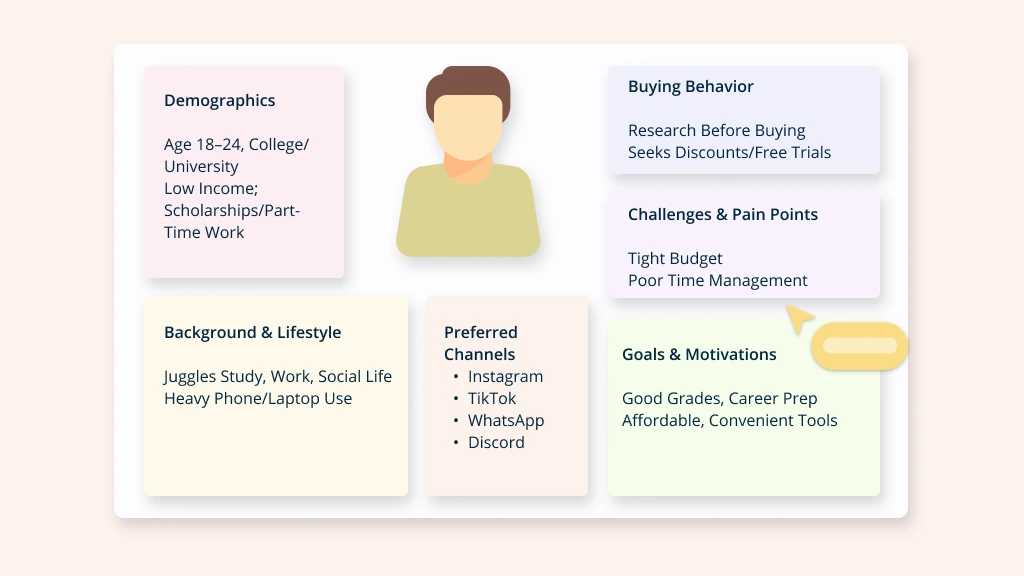Buyer Persona Meaning
A buyer persona is a semi-fictional profile that represents your ideal customer, based on a mix of real data and educated insights about their demographics, behaviors, motivations, goals, and challenges. Instead of describing your audience in broad strokes, a buying persona zooms in on a specific type of customer by giving them a name, a role, and a backstory so your team can easily visualize who you’re talking to.
Key Components of a Buyer Persona
Name & Demographics – A persona should have a realistic name, age, gender, location, and other relevant demographic details.
Occupation/Role – Their job title, industry, seniority level, and key responsibilities.
Goals & Motivations – What they want to achieve personally or professionally, and what drives their decisions.
Pain Points & Challenges – Problems, frustrations, or obstacles they need solved.
Buying Behavior – How they research, evaluate, and make purchasing decisions.
Decision Triggers – Events or needs that prompt them to take action.
Preferred Communication Channels – Where they consume information (e.g., email, LinkedIn, Instagram, webinars).
Background Story – A brief narrative that humanizes the persona and provides context.
Quote or Mindset Statement – A sentence that captures their perspective or priorities.

How to Obtain Customer Persona Data
- Customer Surveys & Interviews – Direct feedback on needs, preferences, and pain points.
- Sales & Support Teams – Insights from those who interact with customers daily.
- Website & Analytics Tools – Data from Google Analytics, heatmaps, and user flow reports.
- CRM & Customer Database – Demographics, purchase history, and engagement records.
- Social Media Analytics – Audience demographics, engagement trends, and sentiment analysis.
- Industry Reports & Market Research – Competitor analysis, market trends, and consumer behavior studies.
- Online Reviews & Forums – Unfiltered customer opinions and recurring issues.
- Email Marketing Insights – Open rates, click-through behavior, and segmentation performance.
- Third-Party Data Providers – Specialized datasets for niche industries or B2B targeting.
Why the Buyer Persona is Important
Tailoring Marketing Campaigns
Customer personas allow you to craft marketing messages that speak directly to your audience’s needs, goals, and pain points. For example, if your persona is a ‘Remote Developer’, your campaign could highlight productivity tools, asynchronous collaboration features, and integrations with GitHub or Slack. This ensures content, tone, and channels are aligned for maximum engagement and conversion.
Adjusting Product Features
By understanding what your personas value most, you can prioritize product updates or features that directly address their challenges. For example, if a key persona struggles with onboarding new employees, you might add guided walkthroughs or pre-built templates to your software. This approach ensures product development is driven by real customer needs, not just internal assumptions.
Aligning Sales Pitches
Sales teams can use buyer personas to customize their pitch for different decision-makers. A CFO persona might respond better to ROI calculations and cost savings, while a Marketing Manager persona might prioritize creative flexibility and audience reach. This reduces friction in the sales process and increases the likelihood of closing deals.
Personalizing Customer Support
Support teams can anticipate common issues based on persona-specific needs and behaviors. For example, a tech-savvy persona might appreciate self-service troubleshooting guides, while a less technical persona may need step-by-step live support. This personal touch improves satisfaction, retention, and brand loyalty.
Focusing Resources Efficiently
Buying personas help you identify the most valuable audience segments so you can invest your time, budget, and team efforts where they have the greatest impact, reducing wasted spend on low-value leads.
Unifying Cross-Functional Teams
Personas serve as a shared reference point for marketing, sales, product, and support teams, ensuring everyone is aligned on who the target customer is and how to serve them best.
Enabling Long-Term Strategic Planning
Beyond short-term campaigns, personas inform product roadmaps, brand positioning, and market expansion strategies by grounding decisions in customer-driven insights.
Benefits of Creating Buyer Personas
- Sharper Audience Targeting: Focus your marketing and sales efforts on the customer segments most likely to engage and convert. This avoids wasting resources on audiences outside your ideal customer profile.
- Improved Marketing Messaging: Develop messaging that resonates deeply by reflecting your audience’s priorities, tone, and values. This ensures brand communication feels relevant and personalized across all channels.
- Better Product/Service Alignment: Guide product roadmaps and service offerings based on what matters most to your ideal customers. This aligns innovation and improvements with proven customer needs instead of assumptions.
- Enhanced Customer Journey Mapping: Clearly understand how different customer types move from awareness to purchase in the customer journey. This helps identify opportunities to improve the experience and remove friction at each stage.
- Stronger Sales Enablement: Equip sales teams with a deeper understanding of customer motivations and decision factors. This can increase close rates by ensuring every pitch speaks directly to the right persona.
Difference between B2C and B2B Buyer Personas
While both aim to understand and target the right audience, B2C and B2B buyer personas differ significantly in focus, motivations, and decision-making processes.
Aspect | B2C Buyer Persona | B2B Buyer Persona |
Focus | Individual consumers | Businesses or organizations |
Decision-Maker | The buyer themselves or household members | Often multiple stakeholders (procurement, management, technical teams) |
Motivations | Personal needs, desires, lifestyle preferences | Business goals, ROI, efficiency, compliance |
Buying Process | Shorter, more emotional and impulsive | Longer, more logical and research-driven |
Purchase Drivers | Price, convenience, brand, emotional appeal | Cost-benefit analysis, vendor reliability, service quality |
Data Sources | Social media behavior, consumer surveys, purchase history | Industry reports, business case studies, LinkedIn activity, sales feedback |
Examples | “Fitness-focused millennial who values eco-friendly products” | “IT manager at a mid-sized firm looking for secure cloud solutions” |
Bringing Your Customer Personas to Life with AI
Detailed buying personas turn vague customer profiles into actionable insights that guide marketing, product, sales, and support strategies. By clearly defining who you’re targeting, you can create messaging, features, and experiences that resonate on a personal level. With Creately’s AI Buyer Persona template, you can instantly generate structured profiles, customize them with your team in real time, and keep them updated as your business grows.
Free Buyer Persona Templates from Creately
Helpful Resources for Making Buyer Personas
Discover our collection of buying persona examples you can customize for any industry.
Learn how to use Creately’s AI-powered Buyer Persona template to generate your personas.
Learn how to do target audience analysis for finding your ideal customers.
FAQs about Buyer Personas
What is the difference between a buyer persona and a target audience?
How many customer personas should I create?
How often should I update my buying personas?
Where can I find data to create buyer personas?
Can small businesses benefit from buyer personas?
Do buying personas apply to B2B businesses?
Resources
Akre, V., et al. “Smart Digital Marketing of Financial Services to Millennial Generation Using Emerging Technological Tools and Buyer Persona.” IEEE Xplore, 1 Nov. 2019, https://ieeexplore.ieee.org/abstract/document/9075106.
Duda, Sabrina. “Personas—Who Owns Them.” Omnichannel Branding, 2018, pp. 173–191, link.springer.com/chapter/10.1007/978-3-658-21450-0_8, https://doi.org/10.1007/978-3-658-21450-0_8.






